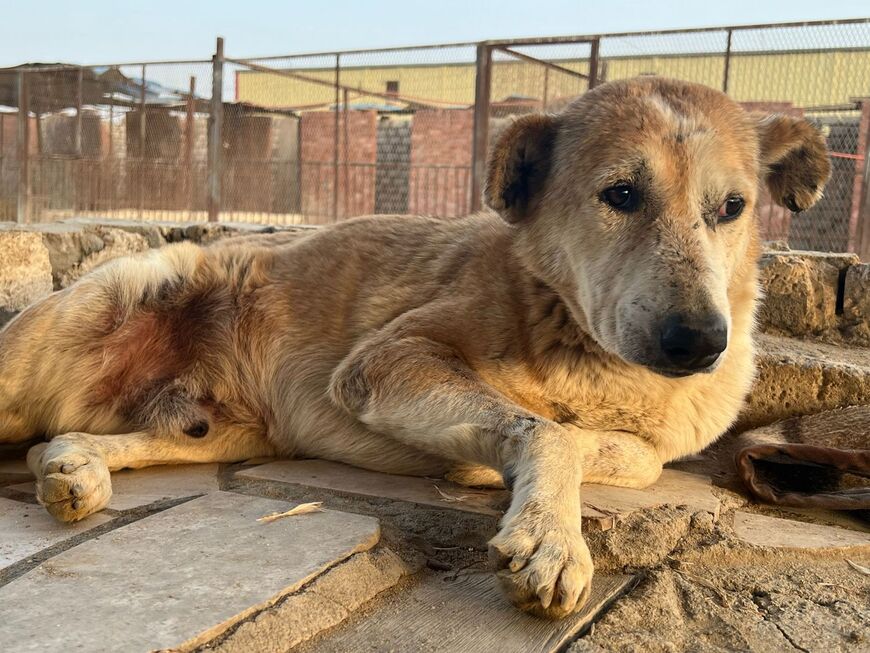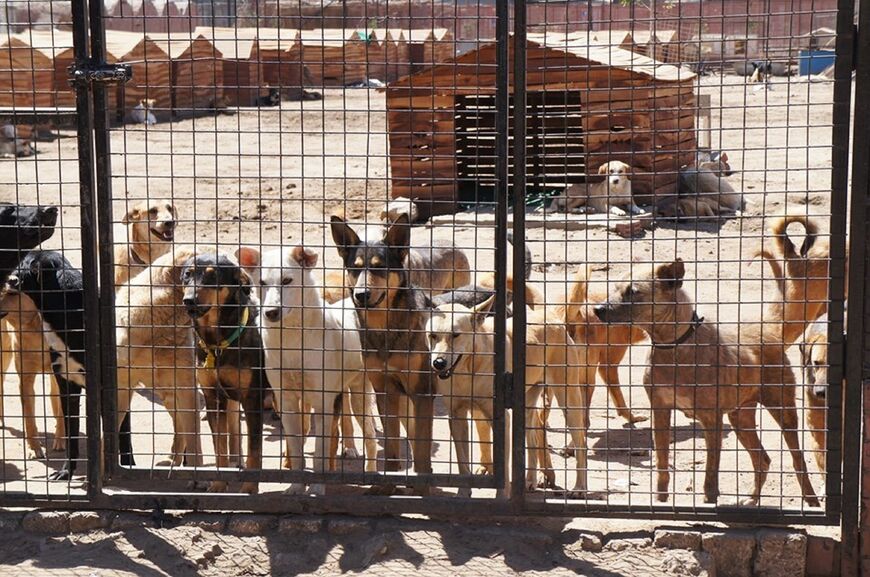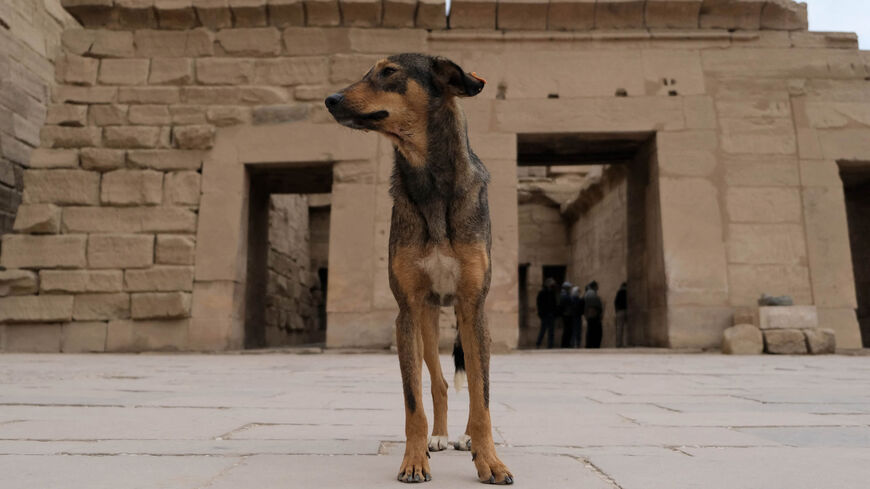CAIRO — Jihan Mahmoud had no choice but to give up her dog that she had been looking after for three years after she became unable to afford its expenses.
A mother of two, Mahmoud became the sole breadwinner after her husband died five years ago. She considered her dog Shiko, who had lived with them since he was four months old, as her third child. About a month ago, she left him at an animal shelter.
“I miss him a lot and his absence breaks my heart, but I can't do anything for him,” Mahmoud told Al-Monitor.
The rapidly rising cost of living has destabilized the family's finances to the point where she can no longer provide the basic necessities for her children, let alone a dog.
Shiko was luckier than Roni, a dog that lived for two years with Samer Adel, who had to abandon him after Roni became ill with a stomach disease. Adel could no longer afford the veterinary expenses.
Adel works as a banker and earns 9,000 Egyptian pounds ($291) per month, which barely covers his own expenses and the regular expenses for Roni, such as food and vaccinations. Roni's illness cost Adel nearly half of his monthly salary, with future expenses expected.

A dog at the ESMA shelter in Cairo. (Courtesy of ESMA shelter)
Adel told Al-Monitor that he spent two weeks contacting shelters to take in Roni, but his request was repeatedly rejected due to a lack of space. The only option left for him was to abandon the dog on the street.
Egyptians have been suffering from increasingly difficult economic and living conditions for over a year now. Since March 21, 2022, the official exchange rate of the Egyptian pound has dropped from 15.6 to 30.9 pounds to the US dollar, while it reached 40 pounds to the dollar in the parallel market.
According to the Central Bank of Egypt, the annual inflation rate in April reached 30.6%. However, Mahmoud, Adel and other pet owners who spoke to Al-Monitor claim that the increase in food and service prices is much higher than the official numbers, especially regarding imported goods such as pet food that increased by about 300%.
Abdelrahman Youssef, director of the Cairo Animals Rescue Team (CART), a local rescue organization, told Al-Monitor that the monthly cost of caring for a single dog has increased in the past year from 500 pounds to 1,200 pounds ($16-$39) in the past year. He said that this amount only covers the dog’s housing, food and regular health-care needs. The cost increases if the dog has a medical condition or requires special treatment.
Youssef focuses his efforts on rescuing stray dogs. He said that he has recently saved a large number of purebred dogs that were abandoned by their owners on the streets.
“I cannot speculate on the main reason why more animals are abandoned, but I have noticed that most of them suffer from diseases that require expensive treatment,” he said.
He explained that CART receives at least five calls daily from pet owners asking if they can accommodate their animals, including cats and dogs.
“The price hikes have also negatively impacted our work as an animal rescue association,” said Youssef. CART has been unable to take in as many animals as they did in the past, and the team has been unable to provide decent food in terms of quantity and quality. Youssef regrets the lack of funding and donations, which even in the past barely covered the expenses related to fieldwork.
Mona Khalil, head of the Egyptian Federation for Animal Welfare, a local nongovernmetal organization that works to protect the rights of animals, manages an animal shelter in Giza governorate. She was forced to reduce the quality and quantity of food provided to the animals, as the financial and in-kind donations provided to the shelter have greatly decreased due to the tough living conditions in the country.
“We no longer have the capacity to accommodate new animals,” Khalil told Al-Monitor. Her shelter hosted 3,000 dogs and cats last year, but this number has decreased to 2,000 due to an inability to afford the cost of feeding the animals and providing them with medical care. She added that despite the lack of space in the shelter, pet owners leave their pets outside the building every day.

Dogs at the ESMA shelter in Cairo. (Courtesy of ESMA shelter)
However, Khalil said she does understand why people are forced to abandon their pets, saying that the price of imported dry cat food, for example, has increased from 680 pounds ($22) to 3,500 pounds ($113). Chicken legs, one of the cheapest dog foods, have also increased in price from 0.50 pounds ($0.016) to 10 pounds ($0.32) per kilogram. One dog eats about 3 kilograms (roughly 7 pounds) daily, she added.
The Egyptian government categorized imported cat and dog food as luxury goods and has imposed tariffs and taxes on them since 2020, totaling 40% (25% customs duties in addition to 14% value-added tax and 1% state resource development fees). The government aims to increase the value of customs duties on pet food by 10% in the 2023-24 budget, which will further push up the prices.
Khalil stressed that locally made alternatives to imported pet food are causing serious health problems for animals, including urinary retention and kidney failure due to the poor quality of the ingredients used in their manufacturing.
“Abandoning your pet on the street means killing it,” warns veterinarian Ahmed Gomaa, who runs a veterinary clinic in the upscale Maadi neighborhood in Cairo. Domestic animals are unaware of the dangers that await them on the road, including getting hit by cars or getting involved in deadly fights with other stray animals, he told Al-Monitor.
Gomaa said that many pet owners have been abandoning their animals in recent months. “Many clients ask me about shelters as soon as they hear the high cost of veterinary care,” he added.
He stressed that veterinary clinics use imported goods, including vaccines, medications, and surgical and laboratory supplies, all of which have at least doubled in price due to the rapid depreciation of the Egyptian pound.
“The cost of medical care for a single dog in Egypt ranges from 2,000 pounds [$65] to 3,000 pounds [$97] if it requires high-quality vaccinations for a period of three months. This amount used to be half a year,” Gomaa noted.
He pointed out that most of his clients have started cutting back on the medical services for their animals, such as preventive vaccinations against insects and parasites.
According to Gomaa, most of his clients visit the veterinary clinic only when their pets are very sick. He said that clients tell him that “as long as the pet remains inside the house, we will not bear the cost of vaccinations." However, he stressed that this approach is medically wrong, because pets need their vaccinations even if they do not leave their home.
The number of cases received by his clinic has decreased by more than 50% monthly. “We face a major challenge as veterinarians. We try as much as possible not to raise the prices of our services, but the increased cost of imported materials forces us to increase prices overall.”
Gomaa suggested sterilization as a solution to control the significant increase in street animals, including those abandoned by their owners. He warned that these animals become very aggressive during the mating season and may attack pedestrians because they consider certain areas to be their territories.







